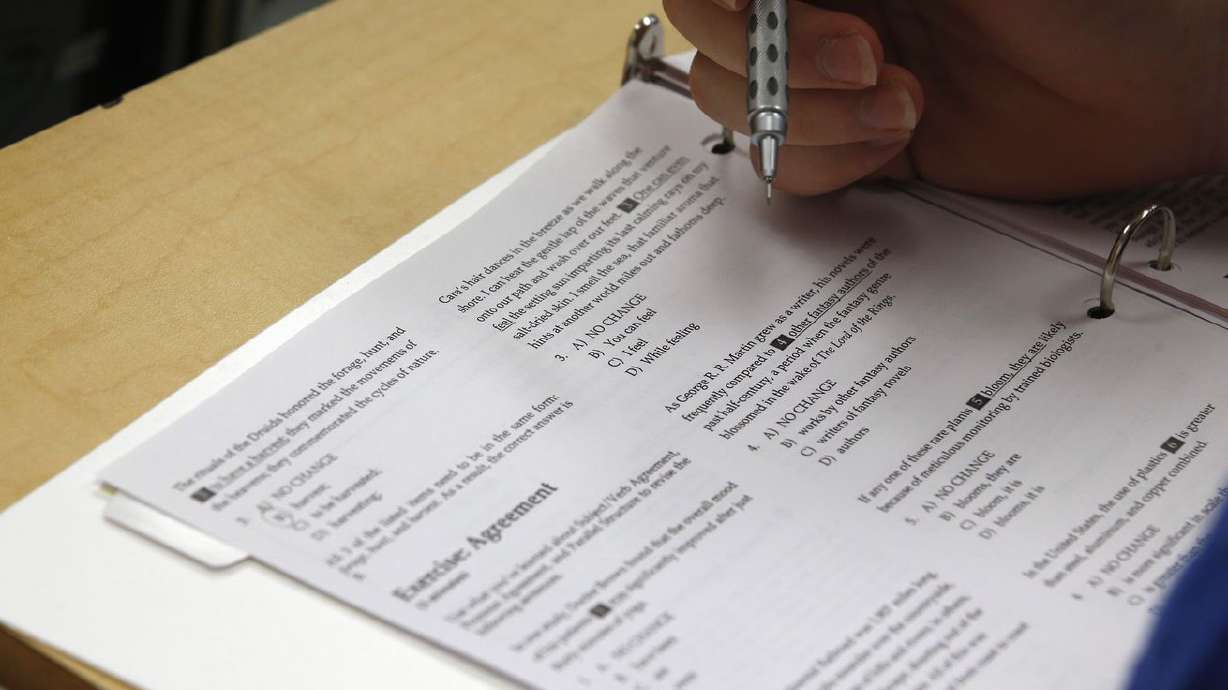Estimated read time: 4-5 minutes
This archived news story is available only for your personal, non-commercial use. Information in the story may be outdated or superseded by additional information. Reading or replaying the story in its archived form does not constitute a republication of the story.
SALT LAKE CITY — Starting in 2024, the SAT administered in the United States is moving online and the digital test will be an hour shorter than the current pencil-and-paper version.
According to College Board, the digital test will be easier to take, easier to administer and more relevant.
"We're not simply putting the current SAT on a digital platform — we're taking full advantage of what delivering an assessment digitally makes possible. With input from educators and students, we are adapting to ensure we continue to meet their evolving needs," said Priscilla Rodriguez, vice president of College Readiness Assessments at College Board, said in a statement.
The announcement comes as a growing number of colleges and universities have shifted to "test optional" admission practices, including a number of Utah institutions. More than 1,800 schools nationwide did not require standardized test scores for 2022 admissions, according to the nonprofit organization FairTest.
Steve Robinson, the University of Utah's senior associate vice president for enrollment management, said SAT's digital format may be helpful to some students.
"As long as students continue to want to take the test, anything that helps with access is a good thing. The digital version of it, if handled well, could really give students who take it a better shot at it. They live in a very digital world so pencil and paper is not their medium," he said.
Another positive is that the test has been reduced from three hours to two hours, "so there's definitely some positives that could come as a result of this," Robinson said.
The university has exercised test-optional admission for the past two years and discussions are underway whether to continue the practice, Robinson said. All of the U.'s PAC-12 peer institutions are either permanently or temporarily conducting test-optional admission, he said.
So it really comes down to I think student behavior, in terms of whether they want or feel they need to take those tests.
–Steve Robinson, University of Utah senior associate vice president for enrollment management
Many colleges and universities shifted to "test-optional" admissions during the pandemic, acknowledging many students did not have access to testing.
Even with test-optional admission, about 55% of the students who applied to the U. for admission last fall submitted either an ACT or SAT score, Robinson said. Among students who enrolled, 66% submitted scores.
Utah State University also temporarily suspended the ACT/SAT test score requirement for admission to its Logan and statewide campuses, although many students take the so-called admission tests to qualify for academic merit scholarships.
High school juniors in Utah take the ACT test as part of the state's public school accountability program, so students have broad access to that test.
Most colleges in the Utah System of Higher Education are open admission, but ACT or SAT scores are used in awarding scholarships, so many students submit them with their applications.
Most applicants to BYU are not required to submit standardized test scores to be considered for admission through winter 2024.
Salt Lake's Westminster College, a private, liberal arts college, is also test-optional.
According to College Board, the SAT's 1,600-point scale will not change and students will continue to take the test in schools or testing centers.
According to its website, test questions "will be more direct, and closely focused on assessing what students need to know to succeed in college and career."
FairTest, the National Center for Fair and Open Testing, called the new digital SAT "a College Board marketing ploy, not a fairer, more accurate admission tool."
In a statement on its website, FairTest said: "Shifting an unnecessary, biased, coachable, and poorly predictive multiple-choice exam that few schools currently require from pencil-and-paper delivery to an electronic format does not magically transform it into a more accurate, fairer or valid tool for assessing college readiness. Just as with previous versions of the 'new improved SAT,' the latest repackaging will not improve its overall value."
More than five decades of experience with test-optional policies demonstrate that neither the SAT or ACT, which is already offered in computer format, "is needed to make admissions decisions that promote equity and academic quality," according to FairTest.
Robinson said he believes the test-optional movement "is certainly here to stay and it's only going to grow stronger. It seems like there's more and more institutions making the decision that they will be permanently test-optional. So it really comes down to I think student behavior, in terms of whether they want or feel they need to take those tests."









